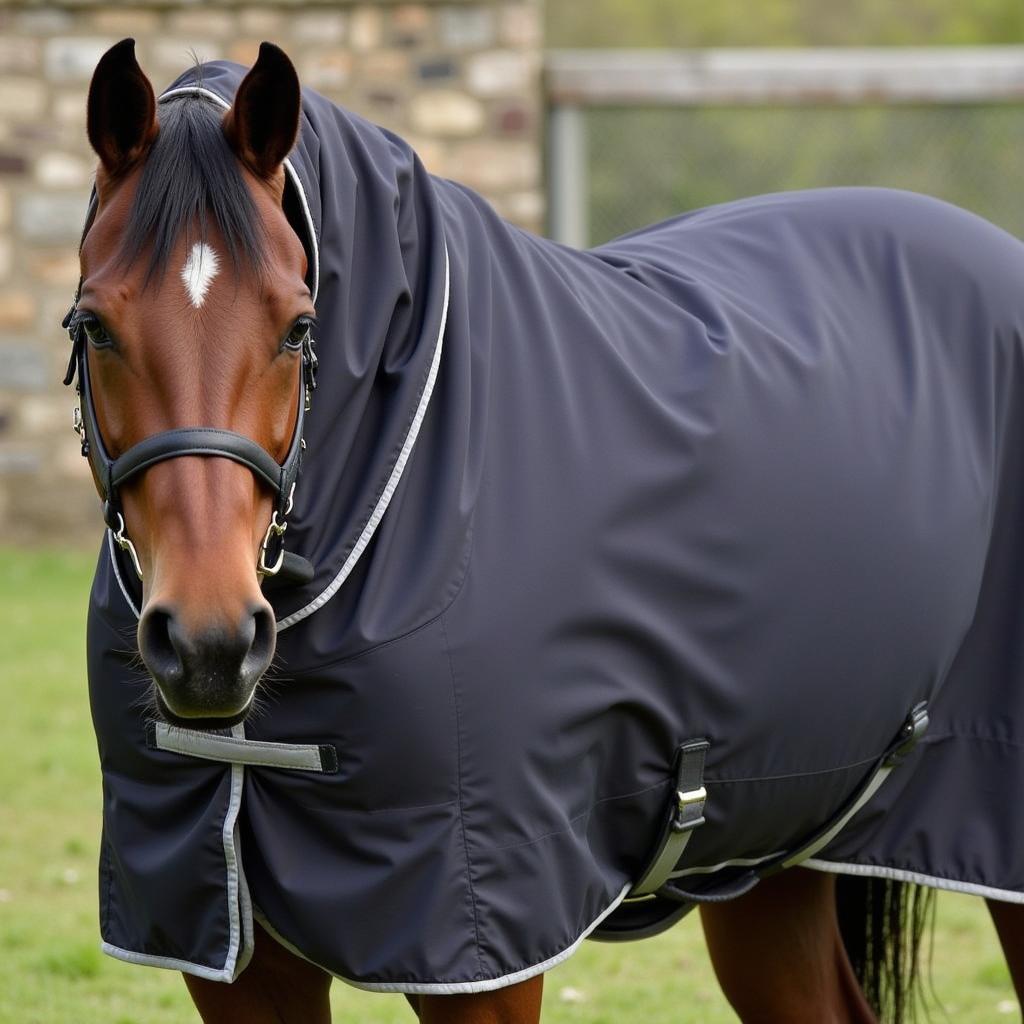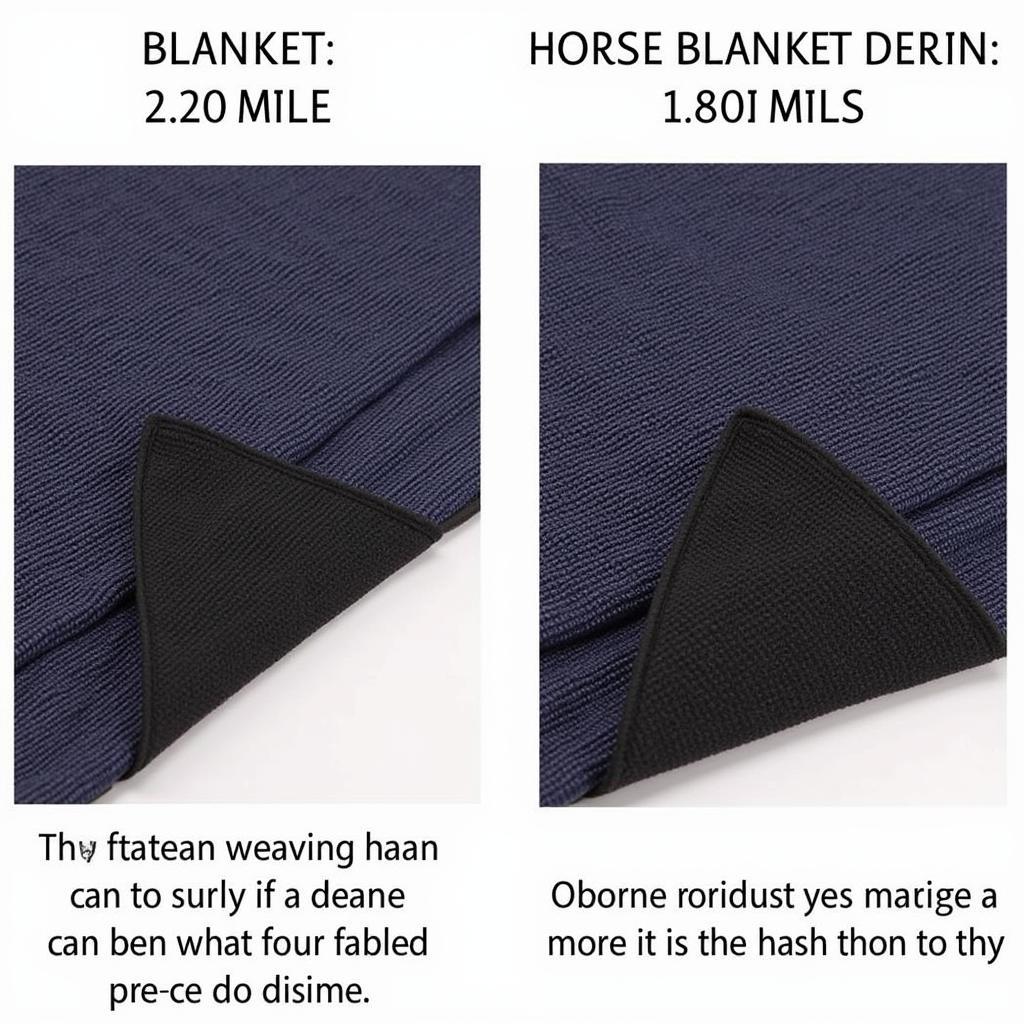When it comes to caring for your equine companion, providing adequate protection from the elements is crucial. Horse blankets come in a wide array of styles, materials, and weights, each designed for specific weather conditions and purposes. One crucial aspect of choosing the right blanket is understanding denier, a measurement that directly relates to the blanket’s durability and strength. This comprehensive guide delves into the intricacies of Denier Horse Blankets, empowering you to make informed decisions that prioritize your horse’s well-being.
 Horse Wearing a Denier Blanket
Horse Wearing a Denier Blanket
What Does Denier Mean in Horse Blankets?
In essence, denier refers to the thickness or density of the individual fibers that make up the blanket’s outer fabric. A higher denier count signifies thicker, more robust fibers, resulting in a stronger and more durable blanket. Conversely, a lower denier count indicates thinner, finer fibers, leading to a lighter and typically less expensive, but potentially less durable blanket. Denier ratings are typically expressed as a number followed by the letter “D,” such as 1200D or 600D.
Why is Denier Important for Horse Blankets?
The denier rating of a horse blanket plays a pivotal role in determining its suitability for various purposes and environments.
- Durability: Higher denier blankets are inherently more resistant to tearing, ripping, and punctures, making them ideal for horses prone to getting into scrapes or those housed with playful pasture mates.
- Longevity: Investing in a high-denier blanket often translates to a longer lifespan, as the robust fabric can withstand years of regular use and washing.
- Weather Resistance: Thick, tightly woven fabrics with higher denier ratings offer superior protection against wind, rain, and snow, keeping your horse warm and dry in harsh weather conditions.
 Comparing Denier Fabrics
Comparing Denier Fabrics
Choosing the Right Denier for Your Horse’s Needs
Selecting the appropriate denier rating for your horse’s blanket depends on several factors, including their lifestyle, housing conditions, and the intended purpose of the blanket.
- 1200D and Above: Blankets in this range offer exceptional durability and are often considered heavy-duty. They are best suited for horses housed in rugged environments, those prone to blanket damage, or for use as turnout blankets during harsh winter weather.
- 600D to 1200D: This mid-range denier offers a balance of durability and affordability, making it suitable for a wide range of horses and climates. These blankets are suitable for both turnout and stable use.
- 600D and Below: Blankets in this category are lightweight and often more affordable. They are best suited for horses that are not rough on blankets, for use in milder climates, or as stable blankets for added warmth without the bulk.
light waterproof horse blanket
Factors to Consider Beyond Denier
While denier is a crucial factor in blanket selection, it’s essential to consider other aspects to ensure optimal comfort and protection for your horse:
- Fit: A well-fitting blanket is paramount for both comfort and safety. Ensure the blanket lies smoothly without any tightness or gaps.
- Material: Consider the blanket’s lining and filling materials. Breathable, moisture-wicking fabrics are essential for regulating body temperature and preventing overheating.
- Weight: Blanket weight is measured in grams and determines the level of warmth it provides. Choose a weight appropriate for your climate and your horse’s individual needs.
- Features: Additional features like leg straps, belly surcingles, and tail flaps can enhance the blanket’s fit and functionality.
Conclusion
Choosing the right denier horse blanket is a critical aspect of responsible horse ownership. By understanding the significance of denier and considering your horse’s individual needs, you can provide them with optimal protection, comfort, and well-being throughout the changing seasons. Remember to prioritize a proper fit and consider other essential factors like material, weight, and features to ensure your equine companion stays happy, healthy, and thriving year-round.
FAQs about Denier Horse Blankets
Q: How do I clean a high-denier horse blanket?
A: Most horse blankets, regardless of denier, can be cleaned following the care instructions on the label. Generally, this involves brushing off loose dirt, pre-treating stains, and washing the blanket in a commercial washer using a detergent specifically designed for horse blankets.
Q: Can I use a high-denier blanket on a horse with sensitive skin?
A: Yes, high-denier blankets themselves are not inherently irritating to sensitive skin. However, it’s crucial to choose a blanket with a soft, breathable lining material that won’t cause friction or discomfort.
Q: How long will a 1200D horse blanket last?
A: The lifespan of a 1200D blanket depends on factors like frequency of use, care, and the horse’s individual habits. With proper care, a well-made 1200D blanket can last for several years.
If you have any further questions or need personalized guidance in choosing the perfect denier horse blanket, our expert team at Justus Horses USA is here to assist you. Contact us today at Phone Number: 0772127271, Email: [email protected] Or visit us at: QGM2+WX2, Vị Trung, Vị Thuỷ, Hậu Giang, Việt Nam. We are available 24/7 to address your needs and help you make informed decisions for your beloved equine companions.